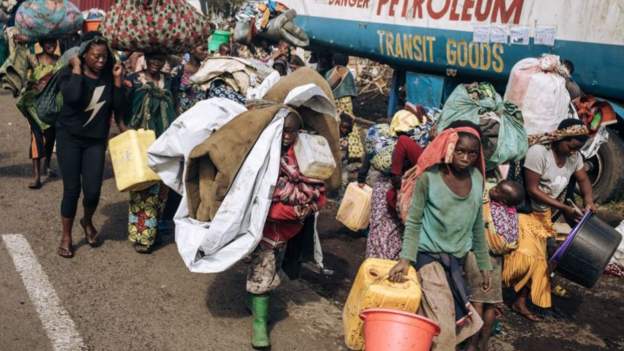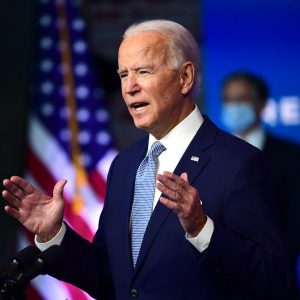Foreign News
Over 130 Civilians Executed by Congo Rebels – UN

A UN investigation has found that at least 131 civilians in the Democratic Republic of Congo died in a November attack by the M23 rebel group.
The UN report said the massacre took place in two villages – Kishishe and Bambo – in the Rutsuhuru district of the eastern North Kivu province.
Investigators said the attack appeared to be a reprisal for a current government offensive on the rebels.
M23 denied the massacre, blaming “stray bullets” for just eight deaths.
But the UN’s Monusco peacekeeping mission in the country said 102 men, 17 women and 12 children were “arbitrarily executed” by the rebel group “as part of reprisals against the civilian population”.
At least 22 women and five girls were also raped, the report said
“This violence was carried out as part of a campaign of murders, rapes, kidnappings and looting against two villages in the Rutshuru territory as reprisals for the clashes between the M23″ and other armed groups, including the FDLR, the statement said, adding that the true number of killed could be even higher.
It also said that M23 fighters then buried the bodies of the victims in “what may be an attempt to destroy evidence”.
The government had initially said that over 300 civilians were killed in the attack, which took place between 29-30 November. But its spokesman Patrick Muyaya accepted on Monday that it was difficult to arrive at a firm figure as the region was under M23 occupation.
Congolese authorities have described the killings as war crimes and called for deeper investigation, while protests have been organised in the capital, Kinshasa and Goma, the main city in North Kivu.
Investigators said they couldn’t access the villages where the massacre occurred, but they interviewed 52 victims and direct witnesses who fled the attack in the town of Rwindi about 20km (12 miles) away.
Witnesses told the UN’s team that members of the rebel group broke down doors, shot civilians, looted property and burned villagers out of their homes.
“MONUSCO condemns in the strongest terms the unspeakable violence against civilians and calls for unrestricted access to the scene and the victims for emergency humanitarian assistance,” the investigators said.
An M23 spokesperson rejected the UN’s findings and insisted that it had “asked that there be investigations together with us in Kishishe but the UN never came”.
“The UN is under pressure from the government to come up with a figure, even if it is false,” spokesperson Lawrence Kanyuka said.
The M23 group was formed a decade ago. It says it is defending the interests of ethnic Tutsis living in DR Congo against Hutu militias and has been involved in a long-running conflict against the central government.
After lying dormant for several years, it took up arms again last year and has been leading an offensive in eastern DRC against the Congolese army.
The massacres in Kishishe and Bambo followed clashes with the FDLR militia, which includes some of the ethnic Hutu leaders of the 1994 genocide in Rwanda who fled across the border into what is now DR Congo.
The M23 has meanwhile accused pro-government forces of “genocide and targeted killings” against the Tutsi community. It said its positions in Bwiza were attacked on Tuesday, despite the current ceasefire agreement.
The M23 has said it is ready to withdraw from the some of the territory it controls. It made the announcement on Tuesday following peace talks in the Kenyan capital, Nairobi, even though it did not attend the talks.
DRC President Felix Tshisekedi has accused neighbouring Rwanda of seeking to destabilase the country by providing weapons to the rebels, an allegation recently endorsed by UN experts. However, this has been denied by the Rwandan government.
More than 100 different armed groups operate in the mineral-rich eastern DR Congo, which has been ravaged by conflict for about three decades.
Several countries have sent troops to DR Congo this year as part of an East African Community (EAC) taskforce to try and disarm the groups and bring peace to the area.
Foreign News
CAF Sanctions Kenya Again over Crowd Trouble

The Confederation of African Football (CAF) has sanctioned African Nations Championship (CHAN) co-host, Kenya, for the second time in as many weeks over security breaches.
In a statement made available on Monday evening, the continental governing body said that it has limited entry to the 48,000-seat Moi International Sports Centre.
It also said that, known as Kasarani Stadium, can accommodate 27,000 fans for Sunday’s Group A match between Kenya and Zambia.
CAF said only electronic ticket holders would be allowed into the stadium, with thermal tickets prohibited.
The governing body warned that Kenya’s matches could be relocated from Kasarani Stadium if organisers fail to prevent further breaches.
“We trust these measures will be applied swiftly to protect competition’s integrity, ensure fan safety, and uphold confidence in Kenya’s commitment to the tournament,” CAF said.
The sanctions follow incidents on Aug. 10 when Kenya defeated two-time winner Morocco 1-0 in spite of playing the entire second half with 10 men.
The win put Kenya top of Group A with seven points.
The debutants would reach the quarterfinals with at least a draw against winless Zambia.
Last week, Kenya’s football federation was fined nearly 20,000 U.S. dollars for security lapses during the team’s 1-0 win over DR Congo in the tournament opener on Aug. 3.
In the latest case, CAF cited major lapses, including stadium gates and restricted service areas being overrun by ticketless spectators and holders of government-distributed physical tickets.
It also accused security personnel of losing control at exit points and allowing breaches of the perimeter fence that enabled thousands of ticketless fans to enter.
CAF had expressed alarm over the use of tear gas and flash grenades, reports of live ammunition fired near spectators and staff, and violent incidents such as stone-throwing at security personnel.
It also cited unsafe vehicle movement in spectator areas, inadequate police response, and the lack of medical incident reports in spite of injuries being reported.
Organisers were further criticised for insufficient communication tools and the absence of CCTV coverage at critical entry points.
Foreign News
Madonna Urges Pope Leo to Visit Gaza

Pop icon Madonna has made an appeal to Pope Leo XIV, urging him to visit the blockaded Gaza Strip amid a starvation crisis that has sparked international outrage.
“You are the only one of us that cannot be denied entry,” the U.S. singer wrote on social media platform X late on Monday.
“We need the humanitarian gates to be fully opened to save these innocent children.
“There is no more time,” she added.
Marking the 25th birthday of her son Rocco Ritchie on Monday, Madonna also announced plans to donate to humanitarian organisations working in Gaza.
“I feel the best gift I can give to him as a Mother is to ask everyone to do what they can to help save the innocent children caught in the crossfire in Gaza,” she wrote.
A United Nations (UN) agency said late last week that “acute malnutrition among children in Gaza has reached the highest levels.”
In July alone, nearly 12,000 children lower than five in age were identified as acutely malnourished, with another 2,500 found to suffer from severe acute malnutrition.
According to the UN Office for the Coordination of Humanitarian Affairs (OCHA), this is the most life-threatening form.
Israel controls access roads to Gaza and has sealed off the coastal area.
Very little aid got into Gaza from March through May, when Israel began allowing in deliveries using a controversial private system that bypasses traditional UN agencies.
Under pressure from allies, Israel recently began permitting larger convoys into the territory, as aid airdrops take place overhead.
On Sunday, Irish rock band U2 issued a stinging critique of the Israeli government’s actions.
“We know Hamas are using starvation as a weapon in the war, but now so too is Israel and I feel revulsion for the moral failure,” frontman Bono wrote.
Foreign News
Putin Bans Foreign-made Clothing for Russian Army From 2026

Russian President Vladimir Putin signed a decree on Monday banning the procurement of foreign-made clothing and related gear for the country’s armed forces starting in 2026.
According to the decree, from Jan. 1, 2026, all uniforms and other clothing items for the Russian Armed Forces must be produced by Russian companies whose manufacturing facilities are located within the country.
By 2027, the requirement would extend to fabrics and knitted materials used in production, which must be domestically manufactured.
The measure aims to entirely exclude the purchase of foreign-made clothing and materials for the needs of the military, the decree said.
Military clothing and gear include uniforms, insignia, underwear, bedding, special clothing, footwear, equipment, and sanitary items.
Such supplies are procured through the Russian state defence order system.




























